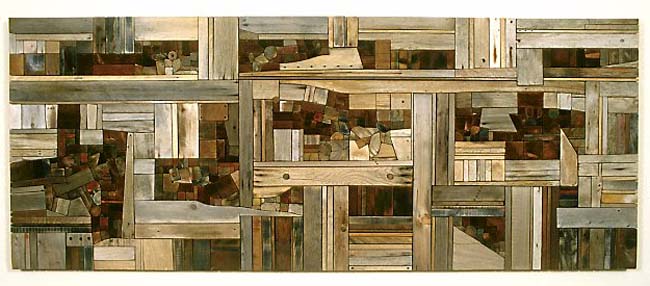When the Metropolitan Museum of Art opens “The Magical City: George Morrison’s New York” on July 17, it will mark the first solo exhibition of Morrison’s work at the Met — seen by many as a milestone for both the artist and the state’s art history.
This will be the first time many will learn Morrison’s New York story.
“Everyone’s looking at it as a big Minnesota moment in New York,” says Brenda Child, the Northrop Professor of American Studies at the University of Minnesota.
Child, who helped found the George Morrison Center for Indigenous Arts, wrote a piece for the exhibition about Morrison that will appear in The Met Bulletin, a journal for the museum.
George Morrison at the exhibition “Standing in the Northern Lights: George Morrison, a Retrospective,” at the Minnesota Museum of Art in St. Paul in 1990. (Photo by Tom Attridge)
The Minnesota Museum of American Art (also known as The M) in St. Paul is a major partner on the exhibition, sending two of Morrison’s sketchbooks and 11 works on paper to New York.
The Met curator is Patricia Marroquin Norby, who has a doctorate from the University of Minnesota and is on the board of The M. The St. Paul museum holds one of the largest collections of Morrison’s work in the world.
“The M is super excited to be partnering with The Met on this exciting exhibition really highlighting one of Minnesota’s most notable artists, George Morrison,” said Kate Beane, director of The M.
Beane explained that Morrison is “an amazing Ojibwe Modernist whose work is seen all over the world and whose work is also quite often visible throughout the Twin Cities.”
Morrison, a Grand Portage Anishinaabe artist, is considered one of the great Abstract Expressionists and Modernists.
He is perhaps most famous for his brightly abstracted works that meditated on the idea of the horizon, directly inspired by his time living on the shores of the “big lake,” or Gichigami/Lake Superior.
Many of these works will appear in the exhibition.
But the main thrust of the show will be Morrison’s time living in New York, how it shaped him and how he shaped the art world.
Morrison moved from Minnesota to New York City in the 1940s to study on a scholarship at the Art Students League. There, he made friends with fellow Modernist all-stars Willem de Kooning, Louise Nevelson, Jackson Pollock and Franz Kline.
He moved back to Minnesota with artist and former wife Hazel Belvo in 1970.
The Met says the exhibition “explores how Morrison’s aesthetic inspiration and future trajectory drew from his love of New York, which he called a ‘Magical City.’ ”
Child says in Minnesota, we tend to underestimate Morrison’s impact outside the state.
“It’s really essential that we acknowledge that George Morrison was at the center of the American Abstract Expressionist movement at mid-century and that he did spend this important part of his career in New York City,” she said.
Related Articles
St. Croix Valley Pottery Tour opens Friday at seven different studios
Novelist Percival Everett and playwright Branden Jacobs-Jenkins among Pulitzer winners in the arts
At NYC art show, St. Paul artists with disabilities take international stage
Made in St. Paul: Portraits of Old Hollywood by oil painter Richard Abraham
Meet the tattoo artists who have created a movement among Timberwolves fans
Beane agreed.
“It’s really, really important for people to understand not just the impact that other places have on Minnesota artists, but the impact that Minnesota artists have outward towards the rest of the country and the rest of the world,” she said. “He was a game changer. He was ahead of his time, and I think what he represents is incredibly important for the public at large to know and see in terms of thinking about Minnesota artists.”
The exhibition will run through May 31, 2026.


Leave a Reply